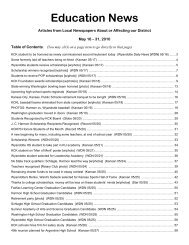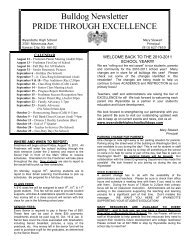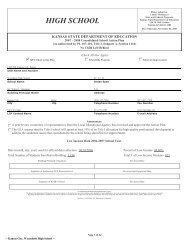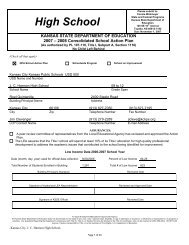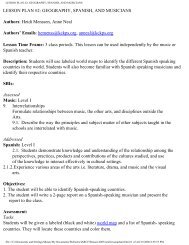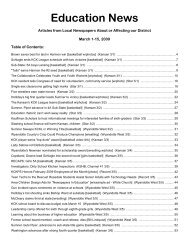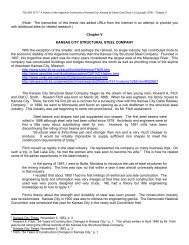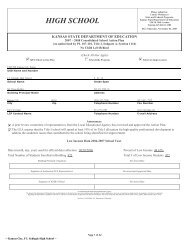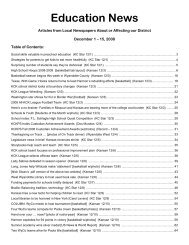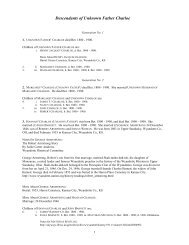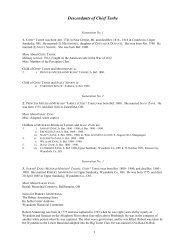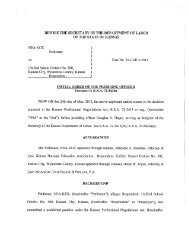Washington - Kansas City, Kansas Public Schools
Washington - Kansas City, Kansas Public Schools
Washington - Kansas City, Kansas Public Schools
You also want an ePaper? Increase the reach of your titles
YUMPU automatically turns print PDFs into web optimized ePapers that Google loves.
VII. PARENT INVOLVEMENT<br />
What strategies are you using to promote effective parent involvement?<br />
gfedcb<br />
gfedc<br />
gfedc<br />
gfedcb<br />
gfedcb<br />
1. Participating in the Family Advocacy. In this system parents and students are assigned one advocate or contact person for<br />
the years they attend a particular school. This advocate is their primary support system and source of information. Parents<br />
are included in goal setting with the student and teachers through this system. This ensures that all the adults in the child’s<br />
educational experience are on the same page.<br />
2. Family Math and Literacy Nights. This is another way to get parents involved in their children’s educational growth. When<br />
parents begin attending these events they become more familiar with the school, which increases a sense of community<br />
among students, parents, and staff.<br />
3. Hiring a parent liaison to coordinate the family events such as Family Night, conferences, Information Fairs, as well as<br />
volunteers and possibly a PTA?PTSA etc. can help promote parent involvement. If it is the main job of a specific person<br />
housed at the school to coordinate these activities they can happen on a regular basis giving parents and students continuity<br />
throughout the school year.<br />
4. Encouraging parents to observe in classrooms – read with the students, or assist teachers helps increase parent ownership of<br />
their children’s education, the school, and become more aware of the daily workings of the school. Additionally behavior of<br />
students improves because an additional adult, specifically a student’s parent, has a presence in the classroom.<br />
5. When teachers contact parents on a minimum of a monthly basis to share achievements and positive feed back on their<br />
students it establishes a good rapport early on so that when negative issues must be addressed a collaborative relationship<br />
has already been built. This helps to keep all the adults involved in a student’s education on the same page, reducing<br />
communication barriers. This also helps to increase attendance at school events and family conferences<br />
Other Parent Involvement strategies:<br />
Provide a time line with opportunities for parental involvement.<br />
<strong>Kansas</strong> <strong>City</strong>, <strong>Kansas</strong> promotes and develops parent involvement through it family advocacy program, which offers a very clear structure<br />
and regular timeline.<br />
Family Advocacy is a way to build a bridge betweenschool and home so that students, their families, and the school staff can all work<br />
together as team. With the ultimate goal of improved student performance, Family Advocacy is designed to engage families in the<br />
education of their children and create a relationship for every student with a school staff member dedicated to that student's success.<br />
The Family Advocacy System matches every student, pre K-12, in the district with an adult, his or her Advocate. The Advocate is often,<br />
but not limited to, a teacher. The Advocate's role is to monitor the student's academic, social, and emotional development on an ongoing<br />
basis, working in partnership with the family for the student's welfare. they do this in three ways:<br />
1. All advocates maintain weekly personal contact with their assigned students throughout the year:<br />
-Check in with each of them in a private face-to-face conversation for five minutes a week.<br />
-Conduct a weekly 30 minute Family Advocacy session with their assigned students around social and affective issues.<br />
2. Maintain monthly contact with the family:<br />
-Keep school and home connected with a phone call, note, email, postcard, newsletter, etc. This<br />
provides a regular quick update on student progress and develops the home/school relationship.<br />
3.Hold at least two conferences per year with the sutdent and family:<br />
-Meet with the family, including the student, once a semester for about 30 minutes.<br />
-Family conferences include communication between home and school, student goal setting, and<br />
planning for the future.<br />
-- <strong>Kansas</strong> <strong>City</strong>, <strong>Washington</strong> High School --<br />
Page 38 of 50



